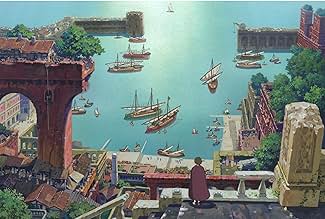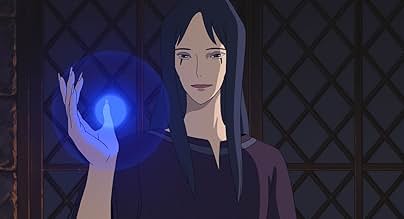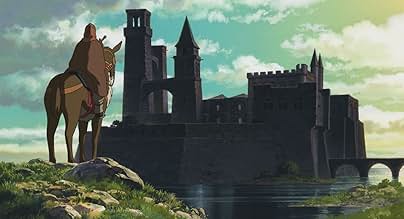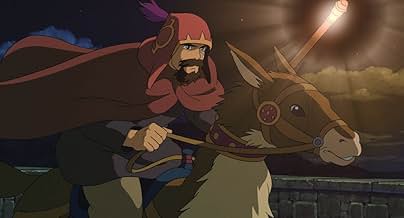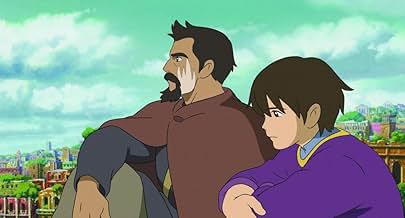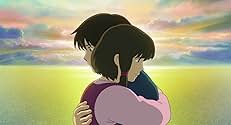AVALIAÇÃO DA IMDb
6,3/10
47 mil
SUA AVALIAÇÃO
Em uma terra mítica, um homem e uma criança investigam uma série de eventos incomuns.Em uma terra mítica, um homem e uma criança investigam uma série de eventos incomuns.Em uma terra mítica, um homem e uma criança investigam uma série de eventos incomuns.
- Direção
- Roteiristas
- Artistas
- Prêmios
- 3 indicações no total
Timothy Dalton
- Sparrowhawk
- (English version)
- (narração)
Willem Dafoe
- Cob
- (English version)
- (narração)
Mariska Hargitay
- Tenar
- (English version)
- (narração)
Jun'ichi Okada
- Arren
- (narração)
Aoi Teshima
- Theru
- (narração)
Bunta Sugawara
- Haitaka
- (narração)
Yûko Tanaka
- Cob
- (narração)
Teruyuki Kagawa
- Hare
- (narração)
Jun Fubuki
- Tenar
- (narração)
Takashi Naitô
- Hazia Dealer
- (narração)
Mitsuko Baishô
- The Mistress
- (narração)
Yui Natsukawa
- The Queen
- (narração)
Kaoru Kobayashi
- The King
- (narração)
Matt Levin
- Arren
- (English version)
- (narração)
Cheech Marin
- Hare
- (English version)
- (narração)
Blaire Restaneo
- Therru
- (English version)
- (narração)
Jeff Bennett
- Additional Voices
- (English version)
- (narração)
Susanne Blakeslee
- The Queen
- (English version)
- (narração)
- (as Suzanne Blakeslee)
Avaliações em destaque
After watching this film I was pleased with the overall feel and look the production. Most notably I was impressed with the studio's visual creation of Earthsea. While the artistry and animation quality does not entirely measure up to other recent Ghibli studio films, I felt it did create a rich and colorful setting in which the story unfolds. A solid score also helps to shape the vibrant world that the movie conveys. However, I wouldn't consider all this to be a faithful representation of Ursula k. Le Guin's literary Earthsea, but rather something unique on to itself. One thing in particular that I think separates the film setting from that of the books' is the absence of the sea. I'm not saying its not there, just that it seems to mostly be in the background.
As for the story I don't think it stands out as anything great. It was limited from the start. The movie like the book is a single episode in a much larger tale. In no way could it possibly encompass the magnitude of the Earthsea series, let alone the main events in The Farthest Shore. It would simply be too much to present in a canvass of its length. As a result It lacks the epic feel of Princess Mononoke or the closure that comes at the end of Spirited Away. In other respects though, the film borrows heavily from Ghibli's previous works, mainly with the characters. They are shadows of former Ghibli creations, but due to their interaction and set of circumstances they retain some originality. I might also add that they come off as serious, and are far removed from the playful personalities that give other Ghibli films their charm. This said they still manage to play out their given roles and drive the story forward. From beginning to end the film holds up in large part because the setting never loses its feel.
I enjoyed this picture in spite of its flaws, again because of it's look and feel. For once I could see winged dragons clash and wizards face off in a Ghibli film. In my opinion Goro Miyazaki did a decent job bringing it all to life. At the same time, I hope he will learn from this experience and strive to do better next time. After my seeing Gedo Senki he has my support.
As for the story I don't think it stands out as anything great. It was limited from the start. The movie like the book is a single episode in a much larger tale. In no way could it possibly encompass the magnitude of the Earthsea series, let alone the main events in The Farthest Shore. It would simply be too much to present in a canvass of its length. As a result It lacks the epic feel of Princess Mononoke or the closure that comes at the end of Spirited Away. In other respects though, the film borrows heavily from Ghibli's previous works, mainly with the characters. They are shadows of former Ghibli creations, but due to their interaction and set of circumstances they retain some originality. I might also add that they come off as serious, and are far removed from the playful personalities that give other Ghibli films their charm. This said they still manage to play out their given roles and drive the story forward. From beginning to end the film holds up in large part because the setting never loses its feel.
I enjoyed this picture in spite of its flaws, again because of it's look and feel. For once I could see winged dragons clash and wizards face off in a Ghibli film. In my opinion Goro Miyazaki did a decent job bringing it all to life. At the same time, I hope he will learn from this experience and strive to do better next time. After my seeing Gedo Senki he has my support.
Watching Tales from Earthsea, I felt like I had been dropped off in the middle of a book series with no real context as to what was going on. I enjoyed the beautiful animation and ended up finding interest in the story and characters, but at the end of the film I still felt like I was missing something. Studio Ghibli probably should have set this one up better.
Eh, let's just call Tales from Earthsea a case of growing pains for Goro Miyazaki.
It's not a bad movie. It's just unremarkable in every way. It doesn't have the creativity, emotional depth, or beauty of Spirited Away, the visual wonder of Howl's Moving Castle, the scope of adventure of Castle in the Sky, the lovable characters of Kiki's Delivery Service, or the sheer delight and fun of Ponyo.
If I had to choose a defining feature for Earthsea, I honestly don't know what it would be. The music is fine, but nothing extraordinary. The character designs and artwork are dangerously close to generic, the story lacks tension and feels almost inconsequential, and the writing is bland. Where's the heart? Where's the humor, the passion, or something that would draw me into the narrative?
I found myself not caring much about what was happening, and more concerned with how much time was left until the movie was over, than anything else. My expectations for Studio Ghibli are far too high to embrace a movie like this that barely scrapes above mediocrity, and from what I've heard from fans of the Earthsea literature, this isn't the adaptation they were hoping for, either.
It's not a bad movie. It's just unremarkable in every way. It doesn't have the creativity, emotional depth, or beauty of Spirited Away, the visual wonder of Howl's Moving Castle, the scope of adventure of Castle in the Sky, the lovable characters of Kiki's Delivery Service, or the sheer delight and fun of Ponyo.
If I had to choose a defining feature for Earthsea, I honestly don't know what it would be. The music is fine, but nothing extraordinary. The character designs and artwork are dangerously close to generic, the story lacks tension and feels almost inconsequential, and the writing is bland. Where's the heart? Where's the humor, the passion, or something that would draw me into the narrative?
I found myself not caring much about what was happening, and more concerned with how much time was left until the movie was over, than anything else. My expectations for Studio Ghibli are far too high to embrace a movie like this that barely scrapes above mediocrity, and from what I've heard from fans of the Earthsea literature, this isn't the adaptation they were hoping for, either.
I am a huge fan of both Ursula Le Guin and Studio Ghibli but the story and the presentation just weren't all they needed to be. The fragments of story they excerpted from the novel lacked cohesiveness, so the characters' stories were truncated and lost. The art work was true to the beauty of Ghibli. I'm disappointed that I can only give this film a 6 (fair) out of 10. {Animated Fantasy}
Better than I expected, a fantastic debut from Goro Miyazaki (son of Hayao Miyazaki) and a worthy addition to Ghibli's consistently brilliant catalog. It follows the prince Arren, as he runs from his kingdom and encounters a wizard named Ged. From here, he is drawn into a classic good versus evil battle. Goro Miyazaki's film bares a lot of similarities to his father's films, but lacks some of the whimsical nature that makes Hayao's movies so distinct. Tales from Earthsea is a more subdued film than films such as Spirited Away and Porco Rosso, and doesn't really hit the emotional or imaginative heights that Hayao Miyazaki's films do. But this isn't always a bad thing - It's simply Goro's style, and this element makes his film a more traditional, perhaps more sensible narrative. Goro has taken a somewhat conservative route with this film - visually and audibly it's classic Ghibli, full of lush environments and excellent animation. In terms of narrative, it carries classic Ghibli (particularly Miyazaki) hallmarks - epic battles of good and evil, cathartic journeys, and the hospitality and grace of ordinary people - but it also has more of a traditional narrative. Good and evil are, unlike many his father's films, clearly defined, and the events of the film lack the extravagance (and imagination) of Hayao's films. It's a wise move - rather than try to re-invent the wheel, Goro has made a wonderfully solid and cohesive film.
To simply compare Goro Miyazaki (and his film) to his father is unfair and sells a great movie short - he has obviously inherited a tremendous flair for storytelling, and with Ghibli's animation team behind him, has created a fantastic debut film. There's another Miyazaki in town - and i can't wait to see where he goes next.
To simply compare Goro Miyazaki (and his film) to his father is unfair and sells a great movie short - he has obviously inherited a tremendous flair for storytelling, and with Ghibli's animation team behind him, has created a fantastic debut film. There's another Miyazaki in town - and i can't wait to see where he goes next.
Você sabia?
- CuriosidadesHayao Miyazaki first wrote to author Ursula K. Le Guin about adapting her book into a film. LeGuin at the time was unfamiliar with Miyazaki's work, and associated animation to be similar to Disney animation, and turned the offer down. After she saw Meu Amigo Totoro (1988), she loved it, and decided to allow the movie to be made.
- Citações
Haitaka: Now listen to me, Aaren: No man nor any living thing in this world preserves their life forever. But only to men is it given to know that we must die, and that is a precious gift. This life that is both our torment and our treasure was never meant to endure for eternity. Life is a wave on the sea. Would you force the sea to grow still to save one wave? To save yourself?
- ConexõesFeatured in Nova York, Eu Te Amo (2008)
- Trilhas sonorasSong of Time
Lyrics by Akino Arai and Gorô Miyazaki and music by Akino Arai and Hisaaki Hogari
Performed by Aoi Teshima
Principais escolhas
Faça login para avaliar e ver a lista de recomendações personalizadas
- How long is Tales from Earthsea?Fornecido pela Alexa
Detalhes
- Data de lançamento
- País de origem
- Central de atendimento oficial
- Idioma
- Também conhecido como
- Cuentos de Terramar
- Empresas de produção
- Consulte mais créditos da empresa na IMDbPro
Bilheteria
- Faturamento bruto nos EUA e Canadá
- US$ 48.658
- Fim de semana de estreia nos EUA e Canadá
- US$ 20.614
- 15 de ago. de 2010
- Faturamento bruto mundial
- US$ 68.725.444
- Tempo de duração1 hora 55 minutos
- Cor
- Mixagem de som
- Proporção
- 1.85 : 1
Contribua para esta página
Sugerir uma alteração ou adicionar conteúdo ausente

Principal brecha
By what name was Contos de Terramar (2006) officially released in India in Hindi?
Responda



